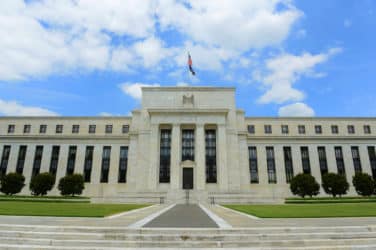
French asset manager Amundi, Swedish insurance company Folksam and UK pension pool Brunel Pension Partnership among a diverse group of 15 institutional investors backing ShareAction’s call for HSBC to reduce its exposure to fossil fuels
Fifteen institutional investors with a combined US$ 2.4 trillion in assets under management have filed a climate change resolution at HSBC, alongside 117 individual shareholders. The resolution, co-ordinated by responsible investment NGO ShareAction, calls on HSBC to publish a strategy and targets to reduce its exposure to fossil fuel assets, starting with coal, on a timeline consistent with the Paris climate goals.
In a sign of the growing appeal of climate resolutions for mainstream investors, the group of co-filers includes Europe’s largest asset manager, Amundi, the world’s largest publicly traded hedge fund company, Man Group, as well as asset managers and asset owners from the UK, Denmark, France, and Sweden.
The institutional co-filing group includes Europe's largest asset manager & top 25 shareholder in HSBC @Amundi_FR, the world's largest publicly listed hedge fund @ManGroup, & leading asset owners & managers from Denmark, France, Sweden & the UK ?
Full list below ? pic.twitter.com/sqc06J750p
— Jeanne Martin (@JeanneMartin25) January 10, 2021
HSBC is Europe’s second largest financier of fossil fuels, after Barclays, according to the Rainforest Action Network (RAN). RAN found it had provided US$87bn to some of the world’s largest fossil fuel companies since the signing of the Paris Agreement (2016-2019). In October 2020, HSBC announced an ambition to be a net zero bank by 2050 at the latest, an important move given the bank’s strong exposure to Asia. But the announcement was criticised by investors and campaigners for making no commitment to reduce HSBC’s funding for fossil fuels, in particular coal, which has risen each year since 2016.
Analysis by ShareAction showed that in the four months leading up to its announcement, the bank pumped an additional US$1.8bn into fossil fuel companies, including those constructing new infrastructure for coal and tar sands. These findings cast serious doubt over the credibility of HSBC’s climate commitments, given that phasing out financing of fossil fuels is an absolute must for any net-zero strategy.
The shareholder resolution is the culmination of a four-year engagement with the bank. In March 2019, a group of investors representing US$1 trillion in assets, co-ordinated by ShareAction, sent a letter to HSBC urging it to restrict its financing of the coal industry. The investor signatories included Schroders, Hermes EOS and Edentree Investment Management.
If the resolution receives more than 75% of the votes at HSBC’s AGM in April 2021, it would require the bank to publish a strategy and short-, medium- and long-term targets to reduce its exposure to fossil fuel assets on a timeline aligned with the goals of the Paris agreement.
The resolution also encourages HSBC to consider the social dimension of the transition to a low-carbon economy (‘a Just Transition’) when developing its strategy. Investors representing more than US $10.2 trillion have expressed support for the Just Transition. It also encourages the bank to use climate scenarios that do not rely excessively on Negative Emissions Technologies when developing its targets. The IPCC special report on 1.5°C states that large-scale CO2 removal is “unproven” and that “reliance on such technology is a major risk in the ability to limit warming to 1.5°C“.
The resolution follows in the footsteps of ShareAction’s January 2020 resolution at Barclays – the first ever climate resolution backed by institutional investors at a major European bank. Barclays responded to that resolution by tabling its own and becoming the first mainstream bank to commit to net zero by 2050 at the latest.
Shareholders filing the HSBC resolution have signalled their hope that the board recommends a vote in favour of the resolution at its April 2021 AGM.
Jeanne Martin, Senior Campaign Manager at ShareAction, said: “The message from the resolution is clear: net zero ambitions by top fossil fuel financiers are simply not credible if they fail to be backed up by fossil fuel phase out plans. Five years after the Paris agreement was signed, HSBC continues to pour billions into the coal sector, a behaviour that is at odds with limiting global warming to 1.5°C. If HSBC is serious about its net zero ambition, it will support this resolution.”
Caroline Le Meaux, Head of ESG Research, Engagement and Voting at Amundi, said: “Climate change represents a systemic risk. The financial sector has a key role to play in supporting the switch to a low carbon economy and the alignment with the Paris Agreement. Engaging with companies on the energy transition and decarbonisation of their activities is one of our key priorities.
Phase out from coal is paramount to achieve this goal, and we believe that the adoption of climate strategies by companies is a critical factor of investment of which shareholders should be fully informed. Amundi thus fully backs this resolution, as part of our more global commitment to banks on their energy transition policy in general and their coal policy in particular”.
Jason Mitchell, Co-Head of Responsible Investment at Man Group, said: “As Europe’s largest bank and the second largest provider of fossil fuel financing, HSBC has the unique opportunity to help lead the financial services sector towards Paris-aligned commitments rather than mere ambitions. As shareholders supporting this resolution, we recognise the imperative and urgency for establishing targets and a timeline towards emissions reductions.”
Natasha Landell-Mills, Head of Stewardship at Sarasin & Partners, said: “In October, HSBC’s Board announced an important ambition: to ensure its financing activities support efforts to limit Global Warming to 1.5C. Attention must now turn to implementation. In light of the urgency of the climate crisis, we have decided to co-file this Shareholder Resolution to seek a clear timetable for emission reductions from HSBC’s financing activities.
In the end, increasing financing for green activities only gets us halfway; the Board must be clear on its intent to withdraw financing of harmful emissions. The sooner the Board sets out its strategy for delivering this, the less disruptive the transition. And – above all – the greater the chances that HSBC helps to build, not destroy, our collective capital.”
Gabriel Vogt, a customer of HSBC and individual filer of the resolution said: “I was disappointed to learn that HSBC still plays such a prominent role in the financing of the coal industry. As a customer of theirs it is frustrating that whilst I try to make sustainable choices in other areas of my life, my bank is enabling such dangerous activity. If they are serious about aligning with the goals of the Paris Agreement they need to take action now to show how they will do this.”
Colin Baines, Investor Engagement Manager at Friends Provident Foundation, said: “HSBC’s ambition for net-zero emissions by 2050 means little without a transition plan to get there, including a timetable to exit fossil fuel finance that is aligned with the climate science. The fact that HSBC is still financing coal and tar sands frankly makes a mockery of any claims to take the climate crisis seriously and invites accusations of greenwash.”
Jens Munch Holst, CEO of AkademikerPension, said: “HSBC’s strong presence in Asia will be critical in encouraging a much-needed transition away from coal dependency in that region, while at the same time increasing HSBC’s own resilience to climate risk. We urge HSBC to listen to its shareholders by introducing robust fossil fuel project and corporate finance restriction criteria and publishing a 1.5°C-aligned engagement policy for its clients in high-carbon sectors.”
Laura Chappell, CEO of Brunel Pension Partnership, said: “We believe this resolution will enable the bank to meet the Net Zero ambition it set out. Banks are the biggest lenders, and so it is crucial for investors to engage with them on this issue, as climate change risk assessment needs to happen along the whole financial chain. As Europe’s second–largest provider of fossil fuel financing, HSBC now needs to set tangible medium- and short-term targets to help turn their Net Zero ambition into reality.”
Stephen Power SJ, Trustee, Jesuits in Britain, said: “The Jesuits in Britain have banked with HSBC for many years and it’s about time the multinational joined the growing social movement to safeguard the future of our younger generations. Echoing Pope Francis’s appeal to companies to move from fossil fuels to renewable energy, we are simply asking HSBC to encourage the companies it supports financially to move towards a low carbon economy.
“In a year when COP26 will hopefully accelerate action towards the goals of the Paris Agreement and the UN Framework Convention on Climate Change, we are asking – as an institutional investor – for HSBC to at least show its concern to work for the fulfilment of the Paris goals and to publish its progress towards that.”
Source: ShareAction






